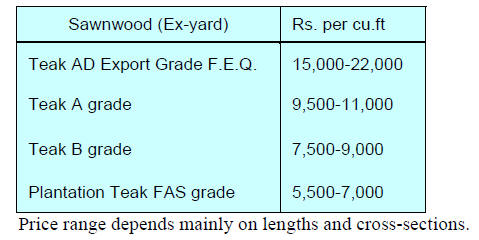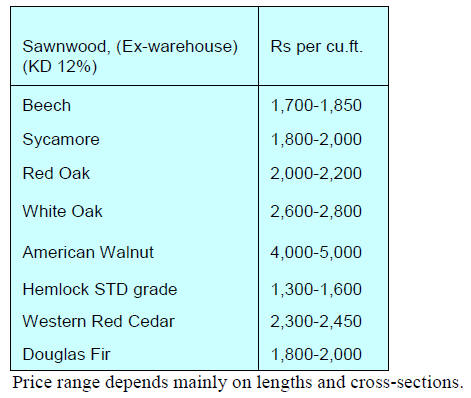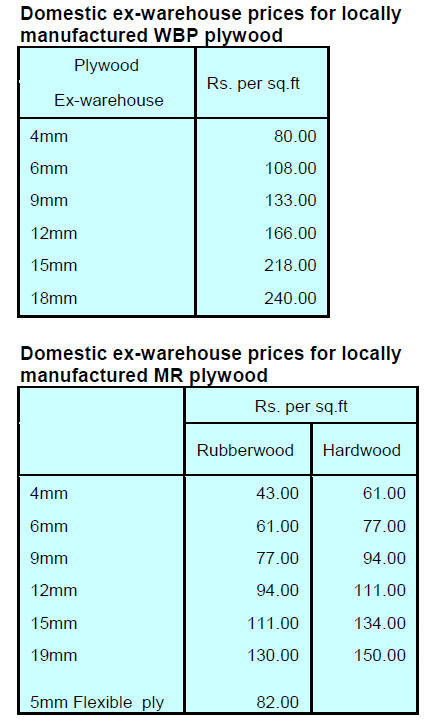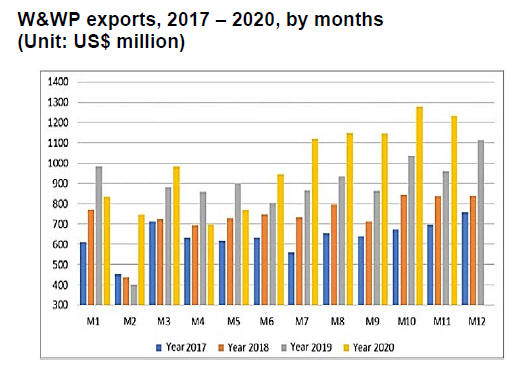4.
INDONESIA
Forestry exports exceed 2020 target
The 2020 export target for forest and wood products has
been exceeded despite the impact of the corona pandemic
on production and trade. Early in 2020 the export target
was lowered from US$10 billion to US$7 billion to take
account of the anticipated disruption of businesses
however, export earnings in 2020 topped US$11 billion
even exceeding the original target.
Bambang Hendroyono, the Secretary General in the
Ministry of Environment and Forestry, said the ministry is
very proud of the performance of Indonesian forestry
sector adding that 2020 forestry export earnings were only
5% below that of 2019. He added that government
incentives and relaxation of regulations helped achieve
this success.
See:
https://foresthints.news/despite-global-pandemicindonesias-forestry-exports-far-exceed-target/
Raw material prices undermining competitiveness
According to the Executive Board of the Indonesian
Furniture and Craft Industry Association (DPP HIMKI)
despite the country having vast forest resources the wood
processing sector struggles to make a real contribution to
national economic growth because the high price of raw
materials undermines competitiveness in the domestic
market and international markets.
During a recent online meeting it was concluded that
downstream SMEs cannot afford to purchase top quality
raw materials so must process low quality wood raw
materials which reduces productivity. The problem of raw
material supply has been raised by Purwadi Soeprihanto,
Executive Director of the Association of Indonesian Forest
Concession Holders (APHI), who said the growth in wood
product processing was hampered by raw matetila supply
and that is why Indonesia has fallen behind Vietnam in
terms of competiveness.
Purwadi said one way to raise the competitiveness of
Indonesian furniture products is to accelerate the
development of plantation forests.
See:
https://www.fordaq.com/news/Indonesia_Raw_material_prices_undermining_70929.html
Over 4 million hectares of forest land reallocated
The Minister of Environment and Forestry (MOEF), Siti
Nurbaya, said her ministry will support the efforts to
restore the national economy in 2021. She said Indonesia’s
forests can support nature tourism and environmental
services. Also, she indicated by changing the allotment
of forest such as land for the object of agrarian reform
productivity for the land can be increased. As of
December the forest land reallocation effort has provided
around 4.4 million hectares to about 882,072 farmers.
See:
https://nasional.kontan.co.id/news/realisasi-perhutanansosial-capai-44-juta-hektare-hingga-awal-desember
Strategy to encourage the furniture and craft
industries
The Indonesian Furniture and Craft Industry Association
(HIMKI) prepared several strategies to encourage the
national furniture and craft industry in 2020. Abdul Sobur,
HIMKI chairman, said the first issue to be addressed
should be a sustainable supply of wood and rattan raw
materials. This, he said, could be achieved with the
formation of a state run ‘Rattan Logistics Agency’.
Another priority area is the elimination of wood and rattan
smuggling.
HIMKI has continued its call for the elimination of the
mandatory SVLK for downstream industries saying this
holds back the competiveness of the sector and urges the
government to support promotion and marketing of wood
and rattan products.
Additional suggestions from the HIMKI include the call
for efforts to raise the quality of rattan furniture and craft
products which should include training and support for
design and advanced technologies.
Finally, Sobur encouraged the government to attract
investment in production in areas with adequate raw
materials.
See:
http://www.jurnas.com/artikel/84663/Strategi-HIMKIDorong-Industri-Mebel-dan-Kerajinan-Nasional/
Indonesia's 2020 forestry success stories
Amid the ongoing global COVID-19 pandemic Indonesian
Environment and Forestry Minister, Siti Nurbaya, has in
an interview with Foresthints.News, highlighted the major
successes achieved in 2020, a year marked by great
difficulties.
The full text can be found at
https://foresthints.news/ministerdont-lose-sight-of-indonesia-2020-forestry-success-stories/

5.
MYANMAR
First ever financial
release from MTE
The Myanma Timber Enterprise (MTE) recently
announced consolidated income statements for the three
fiscal years from 2016-17 detailing sales, operational cost,
taxes, contributions to the state and net profit. This is the
first such disclosure in the history of MTE and is a
significant initiative from MTE to ensure transparency.
Full details can be found at:
(http://www.mte.com.mm/index.php/en/activities/1386-myanmatimber-enterprise-activities)
From 1st April 2014 to 30th November 2020 MTE sold
1,864,921 tons of teak logs, other hardwood logs and
sawnwood earning US$531 million for 414,173 tons of
teak logs. In addition, MTE sold 925,074 tons of logs and
sawnwood in local currency earning around US$349
million (approximately equivalent).
Myanmar exports plunge
In the last two months of 2020 export earnings plummeted
to US$2.647 billion. In the corresponding period in the
previous financial year exports stood at US$3.847 billion
according to the Ministry of Commerce.
Both sea and border trade dropped as neighbouring
countries tightened border security and limited trading to
contain the spread of the virus. While agricultural exports
increased those of livestock, forest products, minerals,
fishery products and finished industrial goods declined. To
make matters worse the severe container shortage has
become the biggest headache for shippers in Myanmar.
In related news, Myanmar’s trade deficit is rising.
Between 1 October and 18 December in the current FY,
Myanmar’s external trade drastically plunged to US$6.14
billion from US$8.206 billion recorded in the same period
a year ago.
The government is trying to reduce the trade deficit by
eliminating imports of non-essentials. Myanmar mainly
imports essential goods such as construction materials,
capital goods, hygiene items and inputs for export
manufacturing.
Over 9,000 jobs created
According to the Directorate of Investment and Company
Administration (DICA) domestic and foreign enterprises
and other regional and state investment bodies created
9,031 jobs in the first two months (October and
November) of the current financial year 2020-2021 but for
October and November the rate was lower than in
September .
(Note: The Ministry of Planning and Finance announced in 2019
a change to the financial year which now ends 30 September
each year)
According to the DICA domestic and foreign projects
created over 96,000 jobs in the FY2016-2017, 110,000
jobs in the FY2017-2018, over 53,000 jobs in the 2018
mini-budget period, over 180,000 jobs in the FY2018-
2019 and 210,000 jobs in the FY2019-2020.
Health Insurance required for travel
Thailand has imposed tougher measures for foreign
travelers entering the country including a requirement for
a US$100,000 health insurance plan with at least six
months validity.
The Myanmar government plans to resume flights to
Southeast Asian neighbours and the MTE has launched a
Travel and Health Insurance (Thailand) service to
facilitate visa applications for those travelling to Thailand.

6. INDIA
Infections contained
in a few States
The New Year has brought further relief from the
coronavirus pandemic in India. Daily new cases are now
averaging around 19,000 per week, the lowest in six
months. The worst of the pandemic now seems
concentrated in Kerala and Maharashtra States. The
country has strated the world’s largest vaccination drive.
A Hindustan Times editorial says even when the pandemic
is under control action will be needed to help people
suffering from pandemic induced stress, anxiety,
depression and insomnia.
Strong GDP growth in 2021 forecast
The National Statistical Office (NSO), on Thursday,
announced its projections for India's GDP in 2020-21,
pegging the Indian economy to contract by 7.7%,
compared to a growth rate of 4.2% in 2019-20.
In its latest review the Reserve Bank of India (RBI) has
projected an economic contraction of 7.5%, an
improvement on its earlier forecast of a 9% plus decline
for fiscal 2020.
However, two successive phases of economic contraction
in the year drove the economy into and times continue to
be tough even though the Purchasing Managers' Index for
manufacturing is continuing to claw into positive territory.
The services and agricultural sectors have been supporting
recovery and this, along with a proposed increase in
government expenditure targeting agriculture as a vehicle
of growth, could lift growth prospects higher.
Analysts suggest the future of the Indian economy will
also hinge on expanded private investment. Of greatest
concern is the financial state of the millions of SMEs in
the country as the temporary relief from the government is
set to end in the months ahead.
Panel makers happy to see resin plant back in
operation
To the delight of plywood and panel makers the Haryana
State Government has approved resumption of
formaldehyde product manufacturing in the factories in the
State subject to clearance by the Environment Department.
Within days of the announcement resin products for the
wood panel industry dropped sharply.
Plyreporter has reported that the Haryana Plywood
Manufacturers’ Association Vice President, Satish Chopal
thanked the State Government for this decision.
See:
https://www.plyreporter.com/article/71922/big-relief-toindustry-by-re-opening-of-formaldehyde-units-in-haryana
Home buyers looking for bigger homes
In pre-pandemic days the real estate sector in India had
been adjusting to demand for moderately priced and
smaller homes but this has changed. Now buyers are
looking for and can afford due to low interest rate bigger
floor space.
The Economic Times reports that Himanshu Parekh a
property adviser in Mumbai as saying people are looking
to upgrade to bigger homes due to work from home and
for online education and that they can now afford the
bigger space housing loan rates are lower now and home
prices have eased. Late in 2020 the preferred size for a
one bedroom unit was 500 sq.ft. up from round 400 sq. ft.
in March 2019.
See:
https://economictimes.indiatimes.com/topic/Home-buyers
New furniture park planned
The Yamuna Expressway Industrial Development
Authority (YEIDA) intends to construct a furniture park
and some 15 firms have expressed an interest in opening
facilities in the Park.
Rakesh Kumar, Executive Director in the Export
Promotion Council, said a furniture park near Jewar
airport would help boost exports and encourage furniture
and handicraft manufacturers.
See:
https://timesofindia.indiatimes.com/topic/furniture-park
Plantation teak
Ship owners are not in a mood to reduce freight rates and
plantation teak shippers are anxious to maintain export
volumes putting Indian importers in a tough spot as they
want to see freight rates come down before committing to
purchases. Indicative FOB prices as of December 2020 are
shown below. It is not possible to provide C&F prices
given the volatile freight rates.

Locally milled sawnwood
Early January 2021 prices for locally milled hardwoods
are shown below. Because of the increased freight costs
exmill prices tend to be at the higher rates.
Millers face the problem of trying to pass on the higher
transport charges but that is difficult even though the
housing market is active.

Myanmar teak
There were no teak deliveries from Myanmar in December
2020 and as of mid January no shipments have arrived in
India. In the domestic market prices can be considered at
the top end of the range shown below.

Sawn hardwood prices
Demand for imported hardwoods is reported as firm which
will eventually give traders the opportunity to lift prices to
take account of the increased freight charges.

Plywood
Plywood mills in the north of the country have resumed
opeartions as most workers are back on the job. This is in
contrast to the situation in mills in the south of the country
and in the Mumbai/Puna area which still face worker
problems along with rising log costs.
It is reported that mills in the Kerala area are taking to
opportunity to retool their presses and boilers in order to
raise productivity.
The short fall in domestic plywood production has given
exporters an opportunity and recently Russian plywood
has been entering the Indian market.

7.
VIETNAM
W&WP export/impor int first 11 months
of 2020
Exports
In November 2020, Vietnam’s wood and wood product
(W&WP) exports were valued at US$1,236 billion, 3.5%
less than that of October, but 20% higher compared to the
same month of 2019.
Of this, WP export accounted for US$1,005 billion, 4.8%
lower compared to the previous month, but 33% up as
compared to the same month of 2019.
In 11 months of 2020 W&WP exports amounted to
US$11,023 billion a 15.6% year on year growth.
In the first 15 days of December W&WP exports were
US$618 million, 20% higher compared to the first 15 days
of November.
All data that follows was provided by the General
Department of Customs, Vietnam and analyzed by GoViet.

During November 2020 W&WP exports by FDI
enterprises were worth US$696 million, up almost 9%
over October and 60% up year on year. In 11 months of
2020 W&WP exports by FDI enterprises amounted to
US$5,395 billion, 28% year on year higher and a 49%
share of total W&WP exports from Vietnam.
Export destinations
Compared to October, W&WP shipped to top destinations
declined. Exports to the US declined by 3%, Japan, 1%,
and South Korea, 5%.

With European markets such as the UK, Germany,
France
and the Netherlands the decline was even greater. In
contrast exports to China continued to grow, rising to
US$90 million, 13% up as compared with the previous
month.
The US topped the list Vietnam’s W&WP export markets
with a share of almost 60%. Over 11 months of 2020 the
US market consumed US$6.369 billion, a year on year
growth of 35%. Following the US, the 3 big consumers of
Vietnam’s W&WP included Japan, China and South
Korea.
Imports
Following a significant increase in October, November
2020 imports of W&WP into Vietnam were valued at
US$252 million, just 1.5% over the previous month, but
15% higher than in the same month of 2019.

In 11 months of 2020 imports of W&WP into Vietnam
totalled at US$2,266 billion, down 1.6% year on year.
During the first 15 days of December, 2020 W&WP
imports amounted to US$156 million.
In November 2020 FDI enterprises imported US$118
million of W&WP, 20% higher than the previous month
and 60% higher than in November 2019. During 11
months of 2020 W&WPs imported by FDI enterprises
amounted to US$921 million, 32% up year on year and
contributed 41% of the total value of W&WP imported
into Vietnam.
In November, 2020, W&WP imports from China, Chile
and Congo increased by 25%, 67% and 43% respectively
as compared to the previous month. Conversely,
November imports from Thailand, Brazil and Laos
dropped sharply compared to October 2020.
Imports from Russia experienced a year on year expansion
of almost 100%. In contrast imports from the US, Brazil,
Germany and Malaysia declined compared to the same
period in 2019.
Vietnam’s forest certification scheme endorsed by
PEFC
In late October 2020, Vietnam’s Forest Certificate Scheme
submitted by Vietnam PEFC Council Member was
endorsed by the PEFC Council General Assembly.
Sustainable Forest management has been implemented in
Vietnam since the 1990s. In 2017, the Ministry of
Agriculture and Rural Development (MARD) assigned the
Vietnam Administration of Forestry (VNFOREST) and
the Vietnamese Academy of Forest Science (VAFS) to
develop Sustainable Forest Management (FM) and Chain
of Custody standards for Vietnam Forest Certification
Scheme (VFCS).
In 2018, the Prime Minister of Vietnam approved the
‘Project on Sustainable Forest Management and Forest
Certification’ through Decision No. 1288/QD-TTg, in
which the Vietnam Forest Certification Scheme (VFCS)
was established and operated under Vietnam
Administration of Forestry, Ministry of Agriculture and
Rural Development.
On 11 January 2019 the Minister of Agriculture and Rural
Development issued a Decision to establish the Vietnam
Forest Certification Office (VFCO). VFCO is responsible
for all activities in terms of sustainable forest management
and forest certification and issues national standards and
guidelines of the VFCS.
The benefits of Vietnam being part of the PEFC alliance
lie in the following:
To manage and use sustainable forest resources,
biodiversity conservation; to protect ecological
environment and values of forest environmental
services; and to promote forest certification in
Vietnam to meet the requirements of domestic
and international markets.
To create a legal source of plantation timber in
forest areas implemented by sustainable forest
management.
To improve the value of plantation timber and
contribute to poverty reduction for people who
depend on forestry for their livelihoods, as well
as increase the export values of timbers and forest
products for the forestry sector.
See:
https://pefc.org/discover-pefc/our-pefc-members/nationalmembers/viet-nam-forest-certification-scheme-vfcs
and
https://laodong.vn/kinh-te/he-thong-chung-chi-rung-quoc-giacua-viet-nam-da-duoc-pefc-cong-nhan-863742.ldo
8. BRAZIL
Action by Amazon Protection Task
Force
The Amazon Protection Task Force was created by the
Brazilian government in 2019 and since it became
operational has filed 114 public civil actions and collected
more than R$2.6 billion in fines from environmental
offenders. Lawsuits were filed against 230 people charged
with illegal deforestation of 135,000 hectares of the Legal
Amazon in the states of Mato Grosso, Pará, Amazonas,
Roraima, Rondônia, Maranhão and Acre.
The task force has also blocked assets worth around
R$169.7 million for three defendants accused of
deforesting 8,400 hectares of the Amazon Forest in the
municipality of Novo Aripuanã, Amazonas State.
In another lawsuit the task force secured the blocking of
R$130.7 million of assets for four environmental offenders
in the municipality of Gaúcha do Norte, in Mato Grosso
due to deforestation of more than 9,000 hectares in the
Amazon.
Support for small businesses
The federal government has approved the third phase of
the ‘National Program to Support Micro and Small
Businesses’ (PRONAMPE) releasing an additional R$10
billion from the Operations Guarantee Fund (FGO to be
used as guarantees for loans made through the programme.
From May to December 2020 more than 440,000
entrepreneurs received support from PRONAMPE. During
this period loans were granted in the total amount of R$33
billion. This programme was created by the federal
government to secure resources for small businesses so
that they could maintain jobs and business operations
during the pandemic.
The recipient companies have to commit to keep
employees and use the resources to finance business
activities such as investments and working capital.
The other programme, SEBRAE (Brazilian Service of
Support for Micro and Small Enterprises) has reported
that, while almost companies are operating, the level of
their revenue is still below that recorded before the
beginning of the pandemic (on average -39%) so
continued access to the fund is vital.
The Ministry of Economy has indicated this is the largest
programme of credit support for micro and small
businesses in the country's history.
US ends anti-dumping investigation of Brazilian
moulding exports
The Brazilian government has welcomed the decision of
US authorities to end anti-dumping investigations of wood
moulding exports from Brazil.
In a joint statement released 31 December 2020 the
Ministry of Economy and the Ministry of Foreign Affairs
reported that they have closely followed the US actions
and provided support to Brazilian exporters. Brazil
maintains that exporters do not practice dumping as
products are sold at fair market prices.
In 2020 Brazil exported approximately US$377 million in
wood mouldings to the US which is around 70% of all
Brazil’s moulding exports.
Tighter control of timber exports
Since the beginning of 2020 the Brazilian Institute of
Environment and Renewable Natural Resources (IBAMA)
has strengthened its oversight of Brazilian timber exports.
Around 35,000 forest products made from timber coming
from natural forests are exported annually with 90% being
shipped through four main ports in the states of Pará,
Paraná, Santa Catarina and Amazonas.
In addition to the monitoring and on-site inspection work
carried out IBAMA has required mandatory inclusion of
the Document of Forest Origin (DOF) registration number
in the Single Export Declaration (Documento Único de
Exportação - DUE).
The DOF is required for transportation, processing, trade,
consumption and storage of forest products and byproducts
coming from native forests.
Details are now loaded directly into the Integrated Foreign
Trade System (Portal Único de Comércio Exterior do
Sistema Integrado de Comércio Exterior) SISCOMEX.
The requirement for a DOF registration number for wood
products export has brought an improvement in inspection
procedures and a significant reduction in the possibility for
corruption.


9. PERU
Wood exports unlikely to take off in
2021
The negative consequences of the pandemic affected the
economic growth of all countries and has impacted
Peruvian exports of traditional and non-traditional
products.
Enrique Toledo, Vice President of the Committee of Wood
and Wood Industries of the Association of Exporters
(ADEX), has reiterated that the Peruvian forestry sector
represents a great opportunity for economic growth, job
creation and social inclusion but the government seems
not to recognize this.
Toledo speculated that timber production and trade will
continue to be impacted by the effects of the pandemic in
2021 and export shipments are unlikely to be more than in
2020.
To address this he suggested the implementation of
measures to support private investment such as the
granting of new forest concessions, the development of
forest plantations and the creation of financial mechanisms
that promote production in the Peruvian Amazon.
Training/technical assistance for companies in Loreto
and Ucayali
The CITEforestal Maynas Institute in coordination with
the ProBosques Project has undertaken activities in
various regions of the Amazon providing technical
assistance and training for forest companies in the region.
In Loreto training on sharpening of stellite tipped saw
blades was conducted late last year.
This training was aimed at raising the technical and
operational skills in sawmilling with the aim of promoting
efficiency in sawmilling and competitiveness in
companies.
Technical assistance was also started for downstream
processors and included guidance on semi-serial
production systems for wood products. Simultaneously, in
Ucayali, work was carried out on the production of doors
to international standard.
In related news the Regional Government of Ucayali
requested technical support for local companies that aimed
to contribute items for the government’s wooden school
furniture purchases saying this will involve 350 Ucayali
SMEs and will generate around 1,500 jobs in the region.
Work continues with micro, small and medium-sized
enterprises in Ucayali on the transition to a semi-serial
production system for doors manufacturing using six
commercially promising local species which are abundant
and have the required technological properties.



